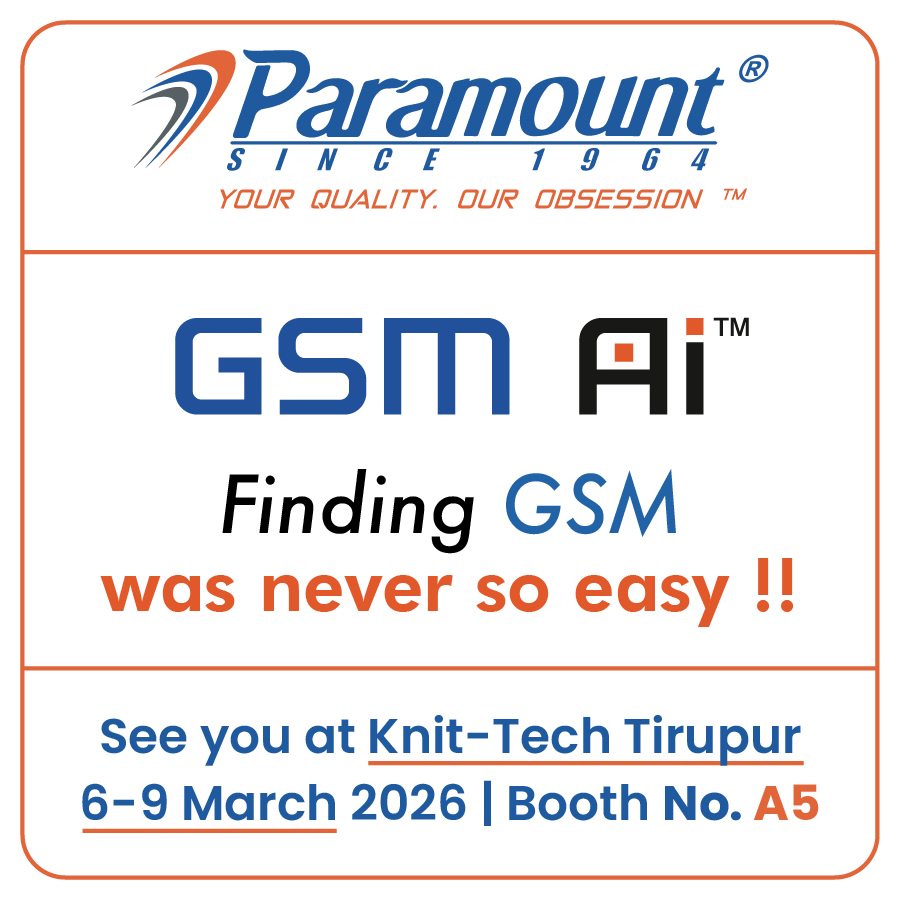 Lasantha Peiris, Executive Director Commercial – FSID in an exclusive interaction with our Editor discussed about the company’s wide range of products for the Indian market with special focus on the textile industry. He also shared FSID’s Initiatives in R&D, Innovations and commitments towards skill development and making sustainable products.
Lasantha Peiris, Executive Director Commercial – FSID in an exclusive interaction with our Editor discussed about the company’s wide range of products for the Indian market with special focus on the textile industry. He also shared FSID’s Initiatives in R&D, Innovations and commitments towards skill development and making sustainable products.
Can you give me a little background about your company?
Fujifilm Sericol India is an integral part of the Fujifilm Ink Solutions Group (FISG), which also includes Fujifilm Specialty Ink Systems UK (FSIS), COUS USA, and Fujifilm Ink Colorants USA has come a long way to be at the forefront of the printing business in India for the past 25 years. Its modern manufacturing plant in Pune, Maharashtra, has ISO 14001:2015, ISO 45001:2018, and ISO 9001:2015 certifications for Screen inks and chemicals, Digital inks, Flexo inks (UV and Water Based), and UV Offset Inks and Varnishes.
We offer a State-Of-The-Art R&D and Innovation Centre, a Fully equipped Colour Management Laboratory in Pune and all our branches in North, East, South, and West, and a fully equipped Technical Training and Demo center for screen printing and wide format digital printers have been remarkable pillars of our company.
Can you tell us more about your R&D Innovation center?
Fujifilm Sericol India launched a state-of-the-art R&D Innovation Centre in October 2019, currently having 10 Doctorates in our R&D facility we believe R&D to be a significant pillar for providing innovative solutions that is synonymous with excellent printing ink quality and is known to develop competitive and trouble-free products regularly for the printing industry. We have laid a framework to innovate eco-friendly printing solutions and introduce good quality, cost-effective, customized products for special printing applications.
With our omnipresent R&D and technically versatile sales teams, we have galloped several steps ahead of our peers in the printing industry. Our marketing model of always being at the customer’s doorstep, never shying away from visiting and attending to customer/s queries and inquiries, armed with not only the salespersons but also a backup team of R&D chemists and technical experts, has always been the comfort for all of our customers. FSID R&D facility is recognized and certified by DSIR, Department of Scientific and Industrial Research of the Government of India, Ministry of Science and technology and has over 20 patents some of which have been commercially successful as well and have contributed to the business growth, no doubt has instilled immense confidence and an unparalleled position within our peers in the ink industry.
How FSID is helping the industry in skill development?
In our training and demo facility, we regularly organize industry training programs for our existing and potential clients and distributors. This course provides a full overview of all aspects of screen-printing processes, the latest trends, and new approaches, as well as a basic theoretical and practical understanding of the procedures and vocabulary of the modern screen-printing process. Hands-on experience with the most recent mesh stretching and stencil-making techniques. Introduction to inks for all applications, four-color process printing, and UV ink technology. With our completely pledged training center for screen and digital applications, we have managed to raise our customers’ service level to the highest pedestal. Having an Application Specialist in Sales force allows us to give value to our customers, making them desire to meet any member of our sales team at any time.
What is your sales and service network in India?
Having sales and distribution offices in Delhi, Mumbai, Kolkata, Tirupur, and Hosur, as well as the central warehouse at Sanaswadi, Pune, makes our products and services easily available to all customers spread across India at their doorsteps. Special mention of a wide distributor network globally spans over 40 countries and is omnipresent not only in India but globally as well.
What all products you are offering?
For more than 25 years, Fujifilm Sericol India (FSID) has been leading the way in UV and solvent-based Screen ink systems, designed to perform to the toughest specifications. Backed by this global experience, FSID offers a complete range of ScreenPrinting Solutions, Label & Packaging Solutions, and Inkjet Printing Solutions, encompassing a wide gamut of applications.
Screen printing solutions have sub-segments of Graphic inks, Industrial inks, packaging inks, Textile inks, Pad Printing inks, Transfer Printing inks, Screen Chemicals, and Emulsions, and Sunglo channel inks that include signs, POP displays, vehicle graphics, LT decals, automotive panels, graphic overlays, credit cards, optical discs, garments, non-garments, sports goods, container decoration, metal decoration Labels, and other various industrial applications as well.
Label & Packaging ink constituting of UV Flexo inks, Aqueous Flexo inks, UV Letterpress inks, UV Dry Offset inks, UV LED Flexo inks, and Low Migration Indirect Food Grade Inks (manufactured through our FSIS factory), and UV Dry Offset inks.
With our Inkjet Printing Solutions, Fujifilm Sericol’s Colour+ range of aftermarket inkjet inks, and textile inkjet and we also provide UV inkjet products that have been formulated to overcome the most demanding digital print environments delivering consistent, high-quality results for a wide range of digital printing applications. By adopting the ink chemistry to precisely suit the characteristics of each make of inkjet printheads, based on specific machines.
What products, you are offering for the textile industry?
Fujifilm Sericol India has been a pioneer in bringing new & innovative products for printing/decorating garments to meet the international standards of most reputed global garment brands. These wide ranges of Textile inks are designed for decorating a wide range of clothing materials including Cotton, Polyester, Cotton and Polyester blends, Lycra, Nylon, Acrylic, and Silk. Additives are also available to create a wide range of special effects.
Direct printing on garments using Screen printing technology has been at the forefront of all printing technologies in the textile segment in the past and present. Having an extensive range of ink chemistries to suit both direct printing and transfer printing we have always been at the forefront and a leading player in the textile printing industry. Also on offer are Textile Transfer Systems, which provide comprehensive solutions for care label printing for tagless as well as tag prints. Our offer comprises inks, adhesives and additives, and complementary printing related consumables. In addition to the normal plastisol inks, the wide product range includes “Phthalate free” inks and PVC and Phthalate free plastisol inks, water-based and solvent-based inks supplied, and several special effect additives such as metallics, puff additives, glitter, and glow in the dark Inks.
The Digital Sublimation, Discharge inks, Pad Printing ink, and Ribbon Printing ink complements our traditional direct and transfer printing ink offers.
Can you tell us about the recently launched “Pioneer Ultra YC”? What makes it unique?
YC is a Globally Patented product and is used for both direct and transfer printing on garments. We manufacture it at the Fujifilm Sericol India factory in Pune. In the textile printing segment, this is the first “plastisol” ink manufactured under PVC/phthalate-free inks category. Conventional plastisol ink system, which contains PVC and phthalate, has unlimited screen stability, which is very much required to work on automatic textile printing machines with a higher flash cure temperature using finer mesh counts (120 threads per cm) generally used for halftone printing. Although considered green, the waterbased textile ink technology does not meet the attributes of indefinite screen stability and it is not workable under higher flash temperatures with finer mesh counts to produce halftone printing and is not matchable for production speed because of screen choking issues. We have developed Pioneer Ultra YC, an alternative to the conventional plastisol system that meets all the brand requirements. Domestic and international brands (buyers), garment manufacturers, and garment screen/transfer printers are using it. Globally, top brands are using our products and we are updating our products regularly with the ZDHC, GOTS, and OekoTex certifications. Many brands such as Nike, C&A, Tesco, H&M, M&S, Tommy, GAP, Walmart, JCPenney, and carrefour are using our YC inks to decorate T-shirts and other types of garments.
Today, sustainability is the key, what efforts Fujifilm is making to make sustainable products?
Leveraging GOTS (Global Organic Textile Standards) certification for our textile ink, we have begun various Aqueous ink initiatives both locally and internationally.
We have a sustainability Advisor based in Pune and reporting to Fujifilm Ink Solutions Group Sustainability (FISG) Director. The Fujifilm Eco website is also monitored for its activities. Fujifilm has adopted a green policy, with the goal of reducing CO2 emissions by 45% by 2030. The policy’s key points are to address climate change, encourage resource recycling, address energy challenges toward a non-carbon society, ensure product and chemical safety, and promote healthy workplace management and employee education. To execute these principles, Fujifilm Group and FSID have launched a new business sector called “SUSTAINABILITY. “Our road map for the future includes an emphasis on Direct CO2 Reduction, Indirect CO2 Reduction, Energy Reduction, and Green Energy Generation. Recycling and recycling discarded inks, reusing, and collecting empty ink containers at client locations, and a proposal to install solar panels on all of our rooftop areas to generate 382Kwh for our use are just a few of the initiatives we are undertaking.
How do you see the digital textile segment?
Owing to digital printing, Fujifilm is not eliminating screen printing. Screen-printing specialty comprises a natural feel, colorful and lively graphics, and special effects that cannot be achieved with digital technology, to name a few. Although digital printing heads and machinery are now deployed in textile continuous printing, screen printing is still prevalent in garment/ T-shirt printing and will be for many years to come.
What are the inks that you are offering for digital textile printing?
We produce dye sublimation and aqueous inkjet inks, as well as dispersed and reactive aqueous inkjet inks. To produce exceptional printing results on a variety of textile substrates, Fujifilm Sericol’ s Aqueous Inkjet inks for digital textile printing applications have been created using an array of highly pure dyes. These are available for a broad spectrum of applications, including garment, commercial, industrial, and packaging print heads.
How important is the textile segment for Fujifilm? In overall revenue, how much is the textile? What is your market share and expected growth in coming years?
The Indian market for textile printing ink is very large and may be segmented into non-garments such as jackets and umbrellas as well as niche brands, sportswear, mainstream brands, and domestic brands. Because we can add value to the printers and the brands, FSID is omnipresent in niche brands and sportswear, especially for export markets. We give our knowledge, R&D skill, and an entire team as a bank of technology to all textile printers. We are not merely a supplier of ink in a pot. Our whole business comprises around 25% of the textile industry.
Clothing being an inevitable need for all humans, it has always been a promising market, especially in the current day it has become a fashion commodity and people need more and more value addition to their clothing which paves the way for more and more printing effects on the garments.
What is your USP in the Industry?
We want to be the ultimate partner for a textile printer’s business, adding value to the expansion of any enterprise, not only as a pot of ink for a customer. Everyone talks about taking a customer-centric strategy, but we use a “Human Centric Approach” while working with our partners. This concept has been championed by our Managing Director Dr. Raghav Rao with various efforts and programs we are doing internally with our staff as well as externally with our print partners. Ensuring our offer of not just a pot of ink at your print shop, but rather a whole company/team offering services towards our print partners to add value to them and spread positive energy and happiness to all of them.
What do you think about India? Where do you think India lacks?
Currently, ink per see does not have sufficient focus. Ink currently is currently associated with the Paint industry, inks in Ballpoint pens, etc. However, industrial ink which we specialize is a more technical and focused product and lacks acknowledgment in the overall ink industry. Currently, most of the raw materials for this ink industry originate from outside India. During the Covid period, we were all abruptly confronted with supply chain challenges which made us appreciate the importance of having raw materials manufactured in India. The Government of India should extend its support to assist micro, small, and medium-sized businesses in producing these raw materials indigenously.
What are the biggest challenges faced by the screen print industry?
In the modern digital economy, disruption is a threat to any process or technology. The threat is not caused by the development of new technology or printing techniques, but rather by the fundamental force behind everything digital. Everything is in danger due to how quickly the digital economy is developing. There is no longer any such thing as the status quo.
Everything in the industrial economy of the previous century was measured in years, including the duration of the finished product, research and development, and product lifecycles. There was time for decision-making. Markets centered on the increased capacity of capital investments in new machinery and automation could emerge. However, the digital economy is a transient one. It is based on iterations that last months or even weeks. Product evolution will accelerate as systems become self-learning until it becomes continuous. We don’t have much we can do about it. It’s happening in almost every industry where digital technology has a stronghold, which is pretty much everywhere. However, due to its inherent advantages over digital printing of ink deposition, screen printing retains an advantage over digital in long-run manufacturing cycles.
What is your outlook for the Indian textile industry in the coming years?
The future of textile industry will be a bit grim due to sustainability mandates and parameters. There is a dire need to educate the masses about regulations as there is a dearth of alternative replacements for hazardous chemicals that were presently used in the textile industry and are banned in the present light of sustainability parameters. This sudden cessation of usage without educating the people on rules, technology and choosing a safe and alternative substitute is a daunting task and would impact the textile industry if it is not embraced in time to grass root levels. If there is no technical support extended, this will impede at the ground level, causing small-scale and micro-scale enterprises to suffer along with the textile industry.






















